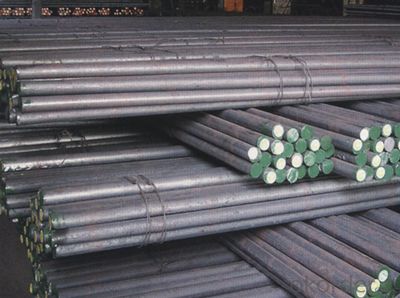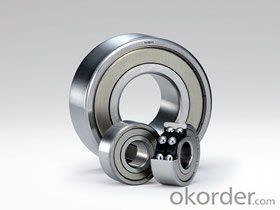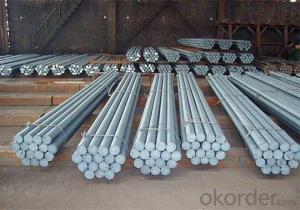Hot Rolled Spring Steel Round Bar 30mm with High Quality
- Loading Port:
- Shanghai
- Payment Terms:
- TT or LC
- Min Order Qty:
- 20 m.t.
- Supply Capability:
- 500 m.t./month
OKorder Service Pledge
OKorder Financial Service
You Might Also Like
Product Description:
OKorder is offering Hot Rolled Spring Steel Round Bar 30mm with High Quality at great prices with worldwide shipping. Our supplier is a world-class manufacturer of steel, with our products utilized the world over. OKorder annually supplies products to European, North American and Asian markets. We provide quotations within 24 hours of receiving an inquiry and guarantee competitive prices.
Product Applications:
Hot Rolled Spring Steel Round Bar 30mm with High Quality is widely used to make the bearing used in automobile, tractor engine, transmission and the wheel. And it also used to make the main bearing for the machine tools, electrical machinery, mining machinery, electric locomotives,mechanical ventilation and high speed of grinding wheel spindle etc
Product Advantages:
OKorder's Hot Rolled Spring Steel Round Bar 30mm with High Quality are durable, diversified and qualified.
Main Product Features:
· Premium quality
· Prompt delivery & seaworthy packing (30 days after receiving deposit)
· Can be recycled and reused
· Mill test certification
· Professional Service
· Competitive pricing
Product Specifications:
Manufacture: Hot rolled
Grade: 20CrNiMoA 20CrNi2MoA 16Cr2Ni4MoA 12Cr2Ni3Mo5A 20Cr2Ni4A 20Cr2Ni2MoA
Cr4Mo4V Cr15Mo4 W9Cr4V2Mo W18Cr4V W6Mo5Cr4V2 5CrMnMo 60CrMnMoNi 37CrA 55SiMoVA etc
Certificates: ISO, SGS, BV, CIQ
Length:6m 8m 9m 12m
Packaging: Packed in bundles with standard export sea-worthy package or as customer require
FAQ:
Q1: Why buy Materials & Equipment from OKorder.com?
A1: All products offered byOKorder.com are carefully selected from China's most reliable manufacturing enterprises. Through its ISO certifications, OKorder.com adheres to the highest standards and a commitment to supply chain safety and customer satisfaction.
Q2: How do we guarantee the quality of our products?
A2: We have established an advanced quality management system which conducts strict quality tests at every step, from raw materials to the final product. At the same time, we provide extensive follow-up service assurances as required.
Q3: How soon can we receive the product after purchase?
A3: Within three days of placing an order, we will begin production. The specific shipping date is dependent upon international and government factors, but is typically 7 to 10 workdays.
Q4: How many types of bearing steel that OKorder.com can supply?
A4: Two types, carbon spring steel and alloy spring steel
Images:


- Q:What is the role of research and development in advancing special steel technology?
- The role of research and development in advancing special steel technology is crucial. Through continuous research and development efforts, new and improved manufacturing processes, alloys, and applications for special steel can be discovered and developed. This leads to advancements in the properties and performance of special steel, making it more durable, resistant to wear and corrosion, and capable of meeting the evolving needs of industries such as automotive, aerospace, and energy. Additionally, research and development help in optimizing production techniques, reducing costs, and promoting sustainability in the special steel industry. Overall, research and development play a vital role in pushing the boundaries of special steel technology, enabling innovation and driving progress in various sectors.
- Q:What is the impact of carburizing on the properties of special steel?
- Carburizing, also known as case hardening, is a heat treatment process that involves introducing carbon into the surface layer of special steel. This process has a significant impact on the properties of the steel, enhancing its hardness, wear resistance, and strength. One of the main effects of carburizing is the formation of a hard outer layer, known as the case, which is rich in carbon. The diffusion of carbon atoms into the steel matrix during carburizing increases the carbon content at the surface, resulting in a higher hardness compared to the core. This hardened case provides excellent resistance against wear, abrasion, and surface fatigue, making it well-suited for applications that require high durability, such as gears, camshafts, and bearings. Additionally, carburizing enhances the strength of the steel, as the increased carbon content improves the material's ability to form martensite, a hard, crystalline structure. This martensitic transformation further contributes to the hardness and strength of the carburized steel, making it suitable for applications that require high load-bearing capacity, such as shafts and axles. Furthermore, carburizing can improve the fatigue resistance of special steel. The hardened case formed during carburizing helps to distribute stress more evenly across the surface, reducing the likelihood of crack initiation and propagation. This increased resistance to fatigue failure makes carburized steel suitable for components subjected to cyclic loading, such as gears and springs. However, it is important to note that carburizing can also have some drawbacks. The increased carbon content at the surface can lead to reduced ductility and toughness, making the material more prone to brittle fracture. To mitigate this issue, it is common to use a lower carbon content steel for the core, ensuring a balance between hardness and toughness. In conclusion, carburizing has a significant impact on the properties of special steel. It enhances hardness, wear resistance, and strength, making it suitable for applications that require durability, high load-bearing capacity, and fatigue resistance. However, the process should be carefully controlled to maintain a balance between hardness and toughness, ensuring the material's overall performance and reliability.
- Q:What are the different methods of surface anodizing for special steel?
- There are several methods of surface anodizing for special steel, including electrochemical anodizing, plasma electrolytic oxidation (PEO), and chromic acid anodizing. Each method has its own advantages and suitability for different steel types and desired outcomes. Electrochemical anodizing involves immersing the steel in an electrolyte solution and applying an electric current to form an oxide layer on the surface. PEO utilizes a high-voltage electrical discharge to create a thicker and more durable anodized layer. Chromic acid anodizing, on the other hand, utilizes a mixture of chromic acid and sulfuric acid to achieve corrosion protection and improved surface properties. The choice of method depends on the specific requirements and characteristics of the special steel being anodized.
- Q:What are the emerging trends in special steel production?
- There are several emerging trends in special steel production that are shaping the industry. 1) Increasing demand for high-performance alloys: With advancements in technology and industrial applications, there is a growing need for special steels with superior properties like high strength, corrosion resistance, and heat resistance. This has led to a higher demand for special alloys such as stainless steel, tool steel, and superalloys. 2) Adoption of advanced manufacturing techniques: Special steel production is witnessing a shift towards advanced manufacturing techniques like additive manufacturing (3D printing) and precision machining. These techniques allow for the production of complex geometries and customized components, leading to improved efficiency and reduced material waste. 3) Focus on sustainability: The steel industry is increasingly adopting sustainable practices to reduce its environmental footprint. This includes the use of recycled materials, energy-efficient production processes, and waste management strategies. As a result, special steel producers are investing in cleaner technologies to meet the growing demand for sustainable steel products. 4) Industry 4.0 integration: The integration of digital technologies, automation, and data analytics is revolutionizing the special steel production process. Industry 4.0 solutions enable real-time monitoring, predictive maintenance, and optimization of production parameters, resulting in increased productivity, quality, and cost-effectiveness. 5) Development of new alloys for emerging industries: With the rise of new industries such as aerospace, renewable energy, and electric vehicles, special steel producers are developing innovative alloys to meet their specific requirements. For example, the development of lightweight, high-strength steels for aerospace applications or corrosion-resistant steels for offshore wind turbines. 6) Global collaborations and partnerships: Special steel producers are increasingly collaborating with research institutions, universities, and other industry players to drive innovation and share knowledge. These collaborations help in developing new steel grades, exploring new applications, and improving production processes. Overall, the emerging trends in special steel production revolve around meeting the demand for high-performance alloys, adopting advanced manufacturing techniques, focusing on sustainability, integrating Industry 4.0 technologies, developing alloys for emerging industries, and fostering collaborations. These trends are shaping the future of special steel production, creating opportunities for growth and innovation in the industry.
- Q:How is special steel machined?
- Special steel is machined using various techniques such as turning, milling, drilling, grinding, and cutting. These processes involve using specialized tools and equipment to shape and remove material from the steel, ensuring precise dimensions and smooth finishes. Additionally, advanced technologies like computer numerical control (CNC) machines are often used to automate the machining process, resulting in higher efficiency and accuracy.
- Q:What are the physical properties of special steel?
- Compared to regular steel, special steel possesses unique physical properties. These properties can vary depending on the specific composition and processing techniques employed. However, special steel typically exhibits high strength, hardness, and durability. Its design often aims to withstand extreme conditions, including high temperatures, pressure, and corrosive environments. Additionally, special steel may display exceptional wear resistance, making it suitable for applications involving heavy machinery or cutting tools. Moreover, it can possess superior electrical and thermal conductivity, along with favorable magnetic properties. In conclusion, the physical properties of special steel render it highly versatile and valuable across various industries, such as automotive, aerospace, construction, and energy.
- Q:What are the key characteristics to consider when selecting special steel?
- When selecting special steel, there are several key characteristics that need to be considered. First and foremost is the composition of the steel. The specific elements and their proportions in the alloy play a crucial role in determining the steel's properties such as strength, hardness, and corrosion resistance. Different applications may require different compositions, so it is important to carefully evaluate the intended use and choose a composition that aligns with the desired performance. Another critical characteristic is the steel's mechanical properties. This includes factors such as tensile strength, yield strength, ductility, and toughness. These properties determine how the steel will perform under various loads and impacts, and it is crucial to select a steel with the appropriate mechanical properties for the specific application. Additionally, the steel's heat treatment capabilities should be considered. Special steels often undergo different heat treatment processes to enhance their properties. Factors such as hardenability, tempering ability, and the ability to retain hardness at high temperatures are important considerations when selecting special steel. Corrosion resistance is also a key characteristic, especially when the steel will be exposed to harsh environments or chemicals. Some special steels are designed to have excellent resistance to corrosion, making them suitable for applications in marine environments, chemical processing plants, or oil and gas industries. Other characteristics to consider include machinability, weldability, and cost. Machinability refers to the ease with which the steel can be cut, drilled, or shaped, while weldability determines how well the steel can be welded without compromising its properties. The cost of the steel is an important factor, as it should align with the budget constraints of the project. In summary, when selecting special steel, it is crucial to consider the composition, mechanical properties, heat treatment capabilities, corrosion resistance, machinability, weldability, and cost. By evaluating these key characteristics in relation to the specific application, one can make an informed decision and choose the most suitable special steel for the intended purpose.
- Q:How is high-temperature steel used in power generation equipment?
- High-temperature steel is used in power generation equipment due to its excellent strength and heat resistance properties. It is specifically utilized in the construction of boilers, turbines, and heat exchangers, where it can withstand extreme temperatures and pressures. This steel ensures the efficient and safe operation of power plants by allowing them to generate electricity through the combustion of fossil fuels or nuclear reactions while enduring high operating temperatures without structural failure.
- Q:How does special steel contribute to improving product resistance to environmental factors?
- Special steel contributes to improving product resistance to environmental factors in several ways. Firstly, special steel alloys are specifically designed to have enhanced corrosion resistance, which helps protect the product from rusting or deteriorating when exposed to moisture, chemicals, or harsh weather conditions. Additionally, special steel can have increased strength and hardness, making the product more durable and able to withstand mechanical stress or impacts caused by environmental factors. Moreover, some special steel alloys have excellent heat resistance, enabling the product to maintain its structural integrity and performance even at high temperatures. Overall, the unique properties of special steel make it an ideal material choice for enhancing product resistance to various environmental factors.
- Q:Can special steel be used for food processing equipment?
- Yes, special steel can be used for food processing equipment. Special steel, such as stainless steel, is often preferred in the food industry due to its hygienic properties, resistance to corrosion, and durability. It is commonly used in various food processing equipment such as mixers, slicers, cutters, and storage tanks to ensure safe and efficient food production.
1. Manufacturer Overview |
|
|---|---|
| Location | |
| Year Established | |
| Annual Output Value | |
| Main Markets | |
| Company Certifications | |
2. Manufacturer Certificates |
|
|---|---|
| a) Certification Name | |
| Range | |
| Reference | |
| Validity Period | |
3. Manufacturer Capability |
|
|---|---|
| a)Trade Capacity | |
| Nearest Port | |
| Export Percentage | |
| No.of Employees in Trade Department | |
| Language Spoken: | |
| b)Factory Information | |
| Factory Size: | |
| No. of Production Lines | |
| Contract Manufacturing | |
| Product Price Range | |
Send your message to us
Hot Rolled Spring Steel Round Bar 30mm with High Quality
- Loading Port:
- Shanghai
- Payment Terms:
- TT or LC
- Min Order Qty:
- 20 m.t.
- Supply Capability:
- 500 m.t./month
OKorder Service Pledge
OKorder Financial Service
Similar products
New products
Hot products
Related keywords






























